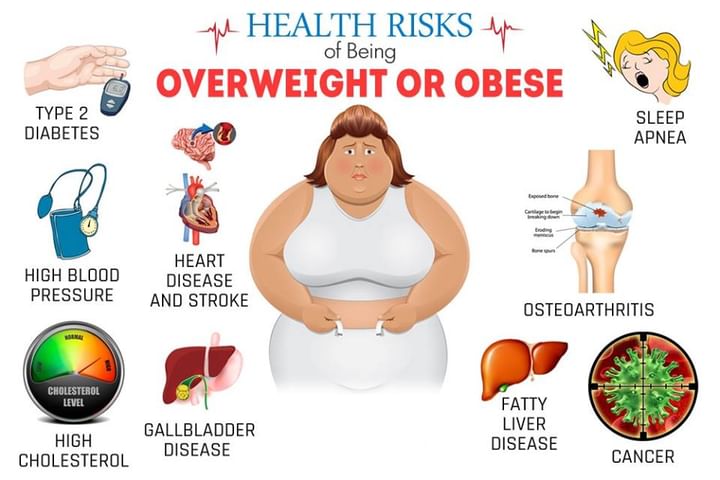What Are the Health Risks of Overweight and Obesity?
What Are the Health Risks of Overweight and Obesity?
Overweight and Obesity-Related Health Problems in Adults
Coronary Heart Disease
As your body mass index rises, so does your risk for coronary heart disease (CHD). CHD is a condition in which a waxy substance called plaque (plak) builds up inside the coronary arteries. These arteries supply oxygen-rich blood to your heart.
Plaque can narrow or block the coronary arteries and reduce blood flow to the heart muscle. This can cause angina or a heart attack. (Angina is chest pain or discomfort.)
Obesity also can lead to heart failure. This is a serious condition in which your heart can't pump enough blood to meet your body's needs.
High Blood Pressure
Blood pressure is the force of blood pushing against the walls of the arteries as the heart pumps blood. If this pressure rises and stays high over time, it can damage the body in many ways.
Your chances of having high blood pressure are greater if you're overweight or obese.
Stroke
Being overweight or obese can lead to a buildup of plaque in your arteries. Eventually, an area of plaque can rupture, causing a blood clot to form.
If the clot is close to your brain, it can block the flow of blood and oxygen to your brain and cause a stroke. The risk of having a stroke rises as BMI increases.
Type 2 Diabetes
Diabetes is a disease in which the body's blood glucose, or blood sugar, the level is too high. Normally, the body breaks down food into glucose and then carries it to cells throughout the body. The cells use a hormone called insulin to turn the glucose into energy.
In type 2 diabetes, the body's cells don't use insulin properly. At first, the body reacts by making more insulin. Over time, however, the body can't make enough insulin control its blood sugar level.
Diabetes is a leading cause of early death, CHD, stroke, kidney disease, and blindness. Most people who have type 2 diabetes are overweight.
Abnormal Blood Fats
If you're overweight or obese, you're at increased risk of having abnormal levels of blood fats. These include high levels of triglycerides and LDL ('bad') cholesterol and low levels of HDL ('good') cholesterol.
Abnormal levels of these blood fats are a risk factor for CHD. For more information about triglycerides and LDL and HDL cholesterol, go to the Health Topics High Blood Cholesterolarticle.
Metabolic Syndrome
Metabolic syndrome is the name for a group of risk factors that raises your risk for heart disease and other health problems, such as diabetes and stroke.
You can develop any one of these risk factors by itself, but they tend to occur together. A diagnosis of metabolic syndrome is made if you have at least three of the following risk factors:
- A large waistline. This is called abdominal obesity or 'having an apple shape.' Having extra fat in the waist area is a greater risk factor for CHD than having extra fat in other parts of the body, such as on the hips.
- A higher than normal triglyceride level (or you're on medicine to treat high triglycerides).
- A lower than normal HDL cholesterol level (or you're on medicine to treat low HDL cholesterol).
- Higher than normal blood pressure (or you're on medicine to treat high blood pressure).
- Higher than normal fasting blood sugar (or you're on medicine to treat diabetes).
- Cancer
Being overweight or obese raises your risk for colon, breast, endometrial, and gallbladder cancers.
Osteoarthritis
Osteoarthritis is a common joint problem of the knees, hips, and lower back. The condition occurs if the tissue that protects the joints wears away. Extra weight can put more pressure and wear on joints, causing pain.
Sleep Apnea
Sleep apnea is a common disorder in which you have one or more pauses in breathing or shallow breaths while you sleep.
A person who has sleep apnea may have more fat stored around the neck. This can narrow the airway, making it hard to breathe.
Obesity Hypoventilation Syndrome
Obesity hypoventilation syndrome (OHS) is a breathing disorder that affects some obese people. In OHS, poor breathing results in too much carbon dioxide (hypoventilation) and too little oxygen in the blood (hypoxemia).
OHS can lead to serious health problems and may even cause death.
Reproductive Problems
Obesity can cause menstrual issues and infertility in women.
Gallstones
Gallstones are hard pieces of stone-like material that form in the gallbladder. They're mostly made of cholesterol. Gallstones can cause stomach or back pain.
People who are overweight or obese are at increased risk of having gallstones. Also, being overweight may result in an enlarged gallbladder that doesn't work well.
Overweight and Obesity-Related Health Problems in Children and Teens
Overweight and obesity also increase the health risks for children and teens. Type 2 diabetes once was rare in American children, but an increasing number of children are developing the disease.
Also, overweight children are more likely to become overweight or obese as adults, with the same disease risks.
If you would like to consult with me privately, please click on 'Consult'.



+1.svg)
